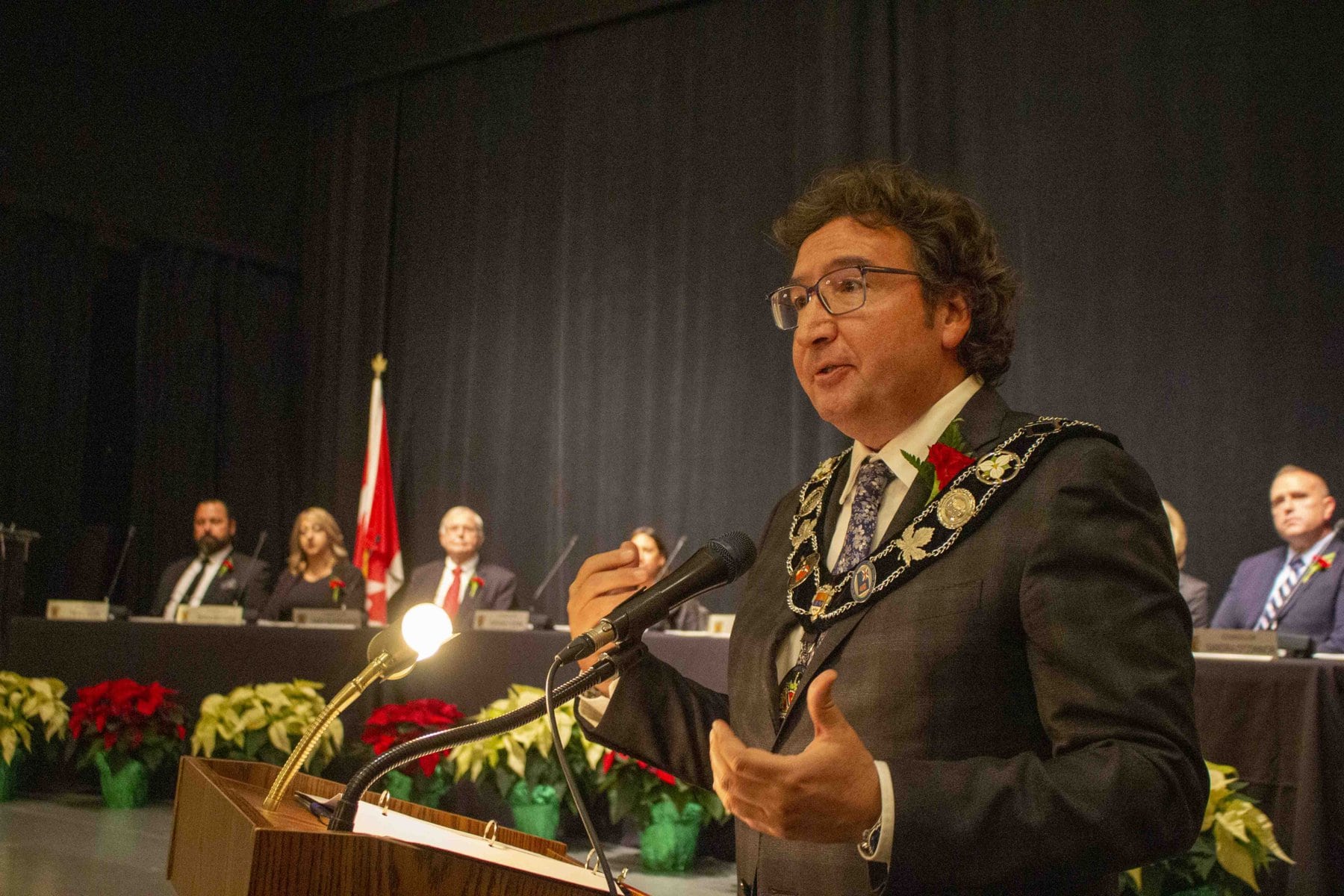New Lord Mayor Gary Zalepa promised “more listening and less talk” as he stood at the podium before a half-packed Court House auditorium Tuesday night at the town’s inauguration of its new council.
After promising to build bridges between the town, the region and the province throughout his campaign, Zalepa pledged “to grow and strengthen the relationships, build trust and provide leadership to council.”
“I remain focused on the outcome, ensuring that those taking their oaths tonight return to you in four years, stating emphatically that they enjoyed their experience on council,” he said.
In his speech, Zalepa explained that he took the time to meet with each member of the new council, as well as new regional Coun. Andrea Kaiser when setting priorities for his first term as lord mayor.
He said the town’s staff will be “forced,” then corrected himself to laughs from the crowd, saying they will be “tasked” with focusing on “core strategic items” as the new council begins its four-year term.
His top priorities include economic development, the town’s customer service, and increased access to public services like health care and transportation.
“The process is going to include feedback and sessions and public engagement from across all our villages,” Zalepa added.
He plans to hold open public forums “every couple of months” throughout the town’s individual villages to make council more accessible to people.
Coun. Adriana Cater Vizzari, who drew a lot of support from her neighbours in St. Davids, said she was looking forward to the forums.
“I do think that people will speak,” she said when asked if residents of St. Davids would be interested in a village forum idea.
“I think as a community, we understand we need to start doing this just because it’s becoming reactionary instead of proactive when we don’t have representation.”
The forums are part of a larger strategy to make council more transparent to the public.
“It’s really going to help us build that trust and confidence with residents that their government is able to listen to them,” Zalepa said in an interview after the inauguration.
“We need to leverage the strength and reputation that we have in our agricultural sector,” he said in his speech.
The town, well-known for it’s winemaking industry and capacity to grow tender fruit like peaches and grapes, is heavily reliant on its agricultural sector as a source of income.
The other commercialized industry the town is known for is tourism.
“Niagara-on-the-Lake is a world-class destination. And it’s also one of the best communities in the world in which to live,” Zalepa told the audience.
He emphasized the need for a well-planned tourism strategy to fully realize the potential of that industry.
He also brought up the town’s customer service, saying he plans to improve its “capacity in responding with resident service requests.”
“Council will need to ascertain the gaps that we have in services and amenities,” he said.
The town has fewer doctors per capita than the national average and has had no hospital for years.
The need for more medical services was a hot topic during the campaign.
Zalepa also spoke of needing more transportation services.
He plans to create “greater linkages for our residents to transit in and around Niagara-on-the-Lake” and the wider region.
Zalepa laced his speech with references to Thomas Jefferson, joking that while “it may seem historically insensitive” to quote an American, he hoped there might be some “great insights” from him.
“We are called to undertake the duties of council with sincere consciousness of the task and their responsibility,” he said paraphrasing Jefferson’s inaugural address.
Retired Rev. Robert Williams led the crowd in a prayer to start and end the gathering, and offered his congratulations to Andrea Kaiser, whom he ran against in the regional race.
Marie Louise, a traditional Indigenous knowledge helper from St. Catharines, delivered a welcoming address for the crowd as well.
Dressed in ceremonial garb, she wore a traditional ribbon skirt to honour the victims and survivors of residential schools
To her recollection and that of the new lord mayor, this will be the first time the town has invited an Indigenous person to speak at a council inauguration.
“I think it’s only appropriate that our towns and our councillors and our people kind of honour the traditional lands but also honour us as Indigenous people,” she said.
She added that it was a good step for the town.
The members of council were sworn in as a group, speaking their pledges in unison with hands raised.
Previous Lord Mayor Betty Disero was among the crowd of about 140 people who attended the inaugural and a reception that followed.
The evening was bracketed with a processional march by three members of the Parks Canada Fife and Drum Corps and by Juliet Dunn, who opened the inauguration with “O Canada” and closed it with God Save the King.










